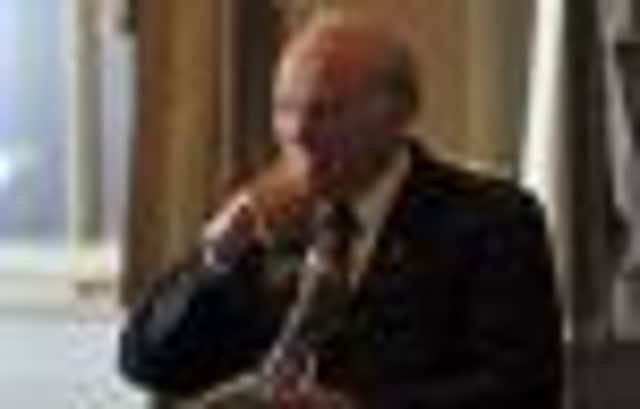Alex Massie: Vince Cable fails to convince when he hails his ‘economic superpowers’


Even by the standards of the breed, however, there is something grim about Vince Cable’s estimation of his own worth.
Asked last week if he would be a fine Chancellor of the Exchequer, the Business Secretary said that, dash it, yes he “probably would”. Cable did admit the inconvenient truth that there is, at present, no vacancy at the Treasury and, in any case, the UK would have to manage as best it can without his services at Number 11 since he is “not pushing for the job”.
Advertisement
Hide AdAdvertisement
Hide AdIt is certainly true that Cable’s evidently low estimation of George Osborne’s abilities is widely shared. Indeed, stocks in Osborne futures have sunk so low in recent months that they may now represent a bargain. If they plummet any further they will reach junk status; a minor rally seems more probable.
Nevertheless, it is remarkable that Osborne continues to be, in effect, a part-time Chancellor. One sometimes wonders if he finds running the Treasury akin to some kind of political housework: tedious, yet necessary. He certainly seems to derive greater enjoyment from his other role as the Conservative party’s chief strategist and electioneer. Politics is a grand game but here too Osborne seems a better tactician than strategist.
Lord Lawson is but the latest eminent figure to suggest Osborne should choose between his jobs and give up one or the other. With impressive understatement, Margaret Thatcher’s chancellor observes that Osborne’s most recent budget “was not his biggest success” but that “he should continue in that job” nonetheless. As supporting statements go, this does not go very far.
Still, it is quite something when George Osborne is not the most conceited member of the cabinet. Even Osborne might baulk at suggesting the government’s survival rests in his hands. Cable, on the other hand, told the Daily Telegraph in 2010 that he possessed “a nuclear option... if they push me too far then I can walk out and bring the Government down and they [the Conservatives] know that”. Since an election means certain doom for the Liberal Democrats, Cable’s nuclear option is worthless. It is, transparently, a bluff. There are almost no conceivable circumstances in which one can realistically imagine it being used.
Despite this, it has plainly been decided that it is better to have Cable inside the Government tent than outside it, even if this means accepting his repeated insubordination. In any case Cable’s much-vaunted principles – the integrity upon which his appeal is said to rest – are pretty worthless too. It seems odd that he could criticise the Government for pursuing reforms in ways akin to a “kind of Maoist revolution” and yet still be happy to draw his ministerial salary as a member of that Government.
Even in government, however, Cable continues to play the traditional Liberal Democrat game of trying to have it both ways. The trappings of power are lovely but they do not, at least as far as Cable is concerned, seem to come with any responsibility. That is, everything sweet is the result of Lib Dem influence; anything rotten the fault of the beastly Conservatives. Voters view it differently. Which is one reason why so many Lib Dems will be hanged at the next election.
Moreover, Cable’s reputation as some kind of genial, venerable, economic soothsayer is itself a matter of some doubt. In March this year he wrote to David Cameron complaining that the Government still did not have a “joined-up” approach to industrial policy. Joined-up government, like efficiency savings, is one of those popular things that are often promised but rarely delivered. They are, everyone agrees, good things but those most in favour of them invariably do not trouble to spell out how precisely they may be achieved.
In Cable’s case this means chuntering that “market forces are insufficient for creating the long-term industrial capacities we need” so the government must “lay out a strategic vision” for these capacities. This is not all. No, again, “we need a more strategic and proactive approach using all of the government’s policy levers” and “we should be willing to identify British success stories… without in any way picking winners.” It takes no great logician to see that identifying British success stories without picking winners (and losers) is contradictory. Furthermore, it is a reminder that Chancellor Cable would be even more of a tinkerer than Osborne has been.
Advertisement
Hide AdAdvertisement
Hide AdNot the least of the last budget’s mistakes was that far from simplifying the tax code, Osborne succeeded in complicating it. Relatedly, favoured “sectors” of the economy (such as the computer games industry) were handed the presents for which they had lobbied, thereby creating fresh anomalies and fresh injustices.
The sorry truth is that the Government’s desire to balance the public finances and promote economic growth are, at least in the short-term, incompatible and the identity of the Chancellor of the Exchequer cannot change that. The best that can be hoped for is that the Government acknowledges its limitations. Alas, it persists in demonstrating the truth of H L Mencken’s aphorism that “For every complex problem, there is a solution that is simple, neat and wrong”.
If Osborne is failing then it is chiefly because he is pinned between events outwith his control and the promises he has made. This may be an inescapable element of the democratic process but, if so, it is another reason to doubt that Chancellor Cable would have fared any better. Indeed, since Osborne’s deficit reduction plan now bears an uncanny resemblance to that promised by Alistair Darling before the last election, the differences between the three main parties are of degree, not kind and, this being so, politicians’ vanity seems even more ridiculous than ever.